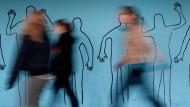Dhe family photo will go down in the history books, diplomats predict. A total of 44 heads of state and government will line up at 2 p.m. in Prague Castle. All European countries are represented, except for two: Belarus and Russia. British Prime Minister Liz Truss is coming, as is Turkish President Erdogan. Ukraine will be represented by Prime Minister Denys Schmyhal. It is the first meeting of the European Political Community, invented by French President Emmanuel Macron. And it should send a clear signal to Moscow: the Europeans stand by Kyiv and will not be divided.
“We stand together – not just the members of the European Union, but all European countries,” said the heads of government of the Netherlands and Albania, Mark Rutte and Edi Rama, in a guest article for the Internet magazine “Politico”. The Russian invasion is forcing everyone to think about how to protect their values and their democracy. “It is self-evident that we need a strong, enduring and united Europe,” they wrote. They named energy supply, the climate crisis, cyber security and joint trade as common challenges.
No closing statement
The heads of state and government will first meet in a plenary session at 1 p.m. The Czech Prime Minister Petr Fialla will be the host, as well as Rama, Truss, the Norwegian Prime Minister Jonas Gahr Støre and the Ukrainian President Volodymyr Zelenskyj, as usual connected via video from Kyiv. It was important for the EU side not to dominate the meeting. In general, it is pointed out everywhere that this is not an “EU plus” format, but a meeting of the states. However, Ursula von der Leyen will also take part as EU Commission President. And the preparation lay mainly with Charles Michel, President of the European Council.
After the family photo, the heads of state and government should exchange ideas in a smaller format. There are two roundtables each on the topics of “Peace and Security” and “Energy, Economy and Climate”. Such a discussion format was already tried out at the EU-Africa summit. Later in the afternoon, two and a half hours are set aside for bilateral talks before meeting again at 7 p.m. for dinner and discussing the individual debates.
There will be no final declaration, which would have required weeks of negotiations. Direct and open exchange is more important, says an EU official. However, the EU side will insist that its partners join the sanctions against Russia. Serbia and Turkey, for example, have so far rejected this, although both are candidate countries.
Wrestling for Erdogan’s invitation
It was by no means a matter of course that all those invited agreed. Truss announced in June that she didn’t think much of the format, back then as Foreign Minister. In the election campaign for the Conservative party leadership, she called it an “open question” whether Macron was a “friend or foe”. Ironically, he had advertised early on to involve the United Kingdom after Brexit via the new format. The British Prime Minister came to Prague on Thursday with the demand to continue to support Kyiv in the war against Russia “with unity and determination”.
But Truss also asked for the oil and gas pipelines that connect the island to the continent to be kept open – an acknowledgment of Britain’s dependence on the continent.
Whether Erdogan should be invited was part of a political struggle in Brussels. Greeks and Cypriots would have liked to keep him at a distance, especially since Turkey has bid farewell to the European consensus on values. However, diplomats pointed out that an exclusion of the Turkish president could have serious consequences for Sweden and Finland: Both countries are waiting for the Turkish parliament – just returned from the summer break – to ratify their accession to NATO.
With Armenia and Azerbaijan, it was not clear that they would be able to sit down at the same table given their ongoing hostilities. It was only in September that fighting broke out, killing several hundred people. Council President Michel managed to lure both of them to Prague. Both countries are part of the EU’s Eastern Partnership, as is Belarus. However, Minsk was not invited because it supports Putin’s attack on Ukraine and is subject to multiple sanctions.
French President Macron proposed a meeting of all Europeans in May. In doing so, he took up the idea of a European confederation that Francois Mitterrand had developed in 1989 after the fall of the Iron Curtain. However, Mitterrand wanted to involve the Soviet Union at the time – which met with resistance from East Central Europeans and meant that the initiative petered out in 1991. This became clear at a meeting at Prague Castle, to which the United States and Canada were also invited.
The European Political Community – without Russia – should have a longer life. It is planned that the heads of state and government will meet twice a year in this format, the next time in a country outside the EU. Several countries have applied, including the United Kingdom and Moldova. Who gets the bid is the only real decision pending in Prague.







